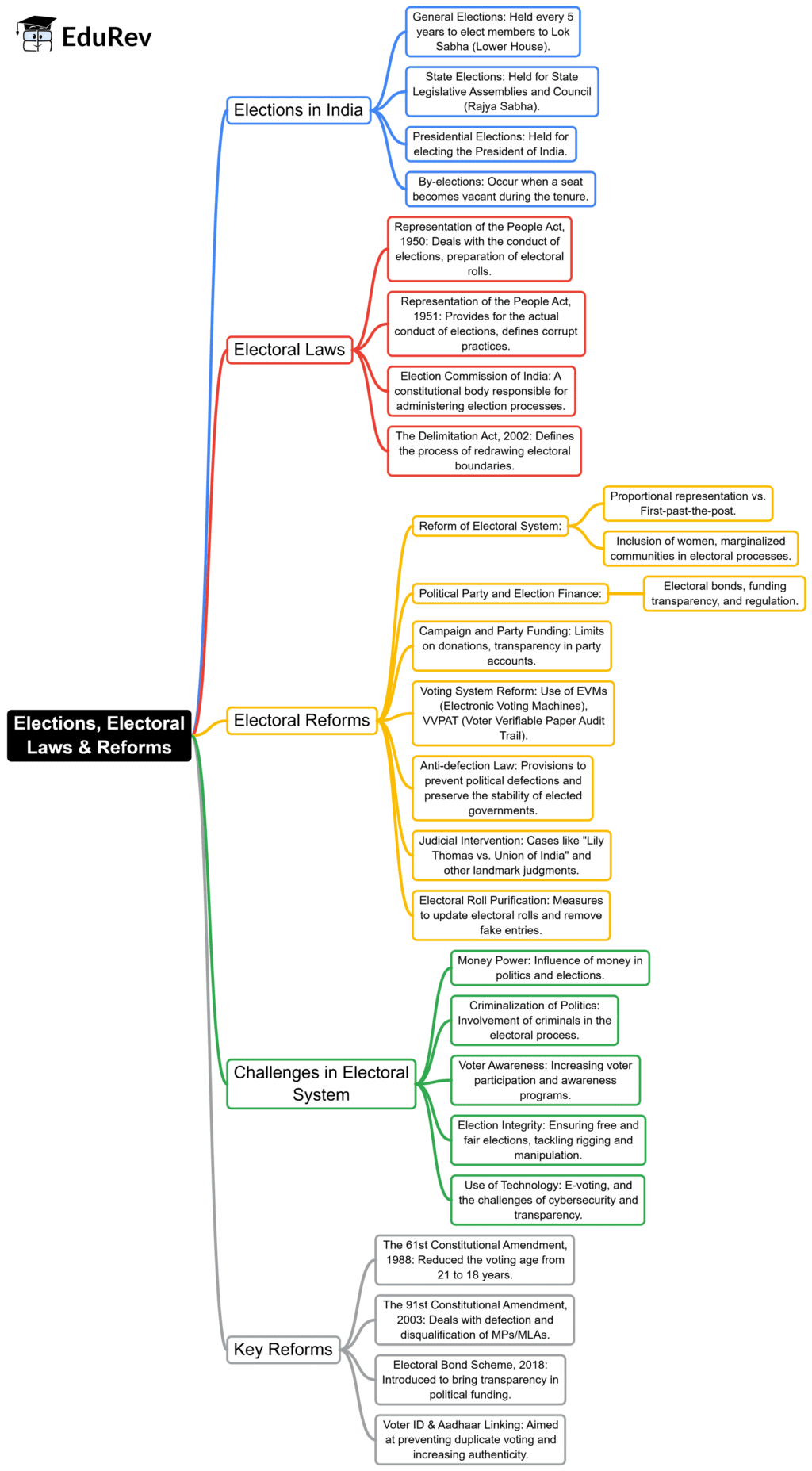UPSC Exam > UPSC Notes > Indian Polity for UPSC CSE > Mind Map: Elections, Electoral Laws & Reforms
Mind Map: Elections, Electoral Laws & Reforms | Indian Polity for UPSC CSE PDF Download

The document Mind Map: Elections, Electoral Laws & Reforms | Indian Polity for UPSC CSE is a part of the UPSC Course Indian Polity for UPSC CSE.
All you need of UPSC at this link: UPSC
|
142 videos|777 docs|202 tests
|
FAQs on Mind Map: Elections, Electoral Laws & Reforms - Indian Polity for UPSC CSE
| 1. What are the key features of electoral laws in India? |  |
Ans. The key features of electoral laws in India include the establishment of the Election Commission, which oversees free and fair elections, the regulation of political parties and their funding, the provision of a code of conduct for candidates and parties, and the establishment of voting procedures. Additionally, laws govern the eligibility criteria for voters and candidates, the process for conducting elections, and the management of electoral disputes.
| 2. How do electoral reforms impact the democratic process in India? |  |
Ans. Electoral reforms aim to enhance the fairness, transparency, and accountability of the electoral process. They address issues such as electoral malpractices, the influence of money and muscle power, and the need for more inclusive representation. By implementing reforms like the introduction of electronic voting machines, direct funding regulations for political parties, and measures to ensure free and fair campaigning, these reforms strengthen the democratic process and boost public confidence in the electoral system.
| 3. What is the significance of the Representation of the People Act? |  |
Ans. The Representation of the People Act is a crucial legislation that governs the conduct of elections in India. Enacted to regulate the electoral process, it outlines the framework for the election of the President, Vice President, and Members of Parliament and State Legislatures. The Act also defines the eligibility criteria for voters and candidates, establishes procedures for electoral disputes, and sets forth provisions to prevent electoral malpractices, thereby ensuring the integrity of the electoral system.
| 4. What changes have been proposed in recent electoral reforms in India? |  |
Ans. Recent electoral reforms proposed in India include measures to enhance the transparency of political funding, the introduction of a system for public funding of elections, and provisions for the use of technology to ensure secure and efficient voting. Other proposals focus on increasing voter engagement, such as the introduction of online voter registration and the use of social media for electoral awareness campaigns. These reforms aim to modernize the electoral process and make it more accessible to the electorate.
| 5. How does the Election Commission of India ensure free and fair elections? |  |
Ans. The Election Commission of India plays a pivotal role in ensuring free and fair elections through various mechanisms. It conducts regular monitoring of the electoral process, enforces a model code of conduct, and oversees the implementation of electoral laws. The Commission also has the authority to disqualify candidates for violations, regulate campaign financing, and facilitate voter education and awareness. By maintaining neutrality and independence, the Election Commission safeguards the integrity of the electoral process.
Related Searches
















